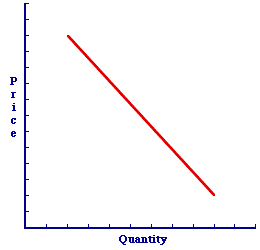
|
|
LOAN LOSS RESERVES: A special account set aside by banks acting as a buffer between deposits and net worth that's used in case a loan is not repaid. Without this reserve, an unpaid loan on the asset side of a bank's balance sheet would require an adjustment of deposits or net worth on the liability side. The loan loss reserve is used for this adjustment.
Visit the GLOSS*arama
|
|


|

|
                           DETERMINANTS: Ceteris paribus factors that are held constant when a curve is constructed. Changes in these factors then cause the curve to shift to a new location. The most common determinants are demand determinants for the demand curve and supply determinants for the supply curve. Other curves used in the analysis of economics also have notable determinants, including the production possibilities curve, the aggregate demand curve, the aggregate supply curve, and the short-run average cost curve. Determinants are ceteris paribus factors that are held constant when a curve depicting the relation between two variables is constructed. Virtually every curve drawn with a two-dimensional graph, especially those used in economic analysis, has one or more ceteris paribus determinants.The reason is that a two-dimensional graph depicts the explicit relation between two variables, even though other relevant variables exist. To isolate the relation between just the two variables, and to construct the corresponding curve depicting this relation, the other factors--the determinants--are held constant. | A Demand Determinant |  |
As an example, consider demand. The law of demand is the relation between demand price and quantity demanded. The demand curve, such as the one displayed in the exhibit to the right, graphically captures this relation, with price on the vertical axis and quantity on the horizontal axis.However, other factors, such as the amount of income that buyers have, can also affect demand. The demand curve is constructed assuming that income is constant. If income should change, then so too does demand, resulting in a shifting or repositioning of the demand curve. To illustrate this shift, click the "Determinant Change" button. Other Relevant FactorsWhile economic models typically focus on the relation between the two most important variables in an analysis, this does not mean other variables are irrelevant or unimportant. Quite the contrary. More often than not, the ceteris paribus determinants are held constant as a means of isolating how they affect the basic relation in a systematic, scientific manner. For example, buyers' income is held constant when constructing the demand curve, NOT because it is unimportant to demand, but to see precisely how changes in buyers' income affect demand. Even though the price-quantity relation is the focus of attention in the study of demand, an alternative curve showing the specific relation between buyers' income and quantity, holding price and the four remaining traditional demand determinants constant, can also be constructed. In this analysis, a change in price would then cause a shift of this income-quantity curve. The construction of a three-dimensional graph, such as one relating price, quantity, and buyers' income, is also a possibility. In this case, the ceteris paribus determinants held unchanged can be any remaining traditional demand determinants--such as, buyers' preferences, other prices, buyers' expectations, and number of buyers. A change in any of these four determinants would then cause a shift or repositioning of this three-dimensional surface. A Few Notable DeterminantsThe ceteris paribus determinants for several important economic relations are worth highlighting. These include the determinants for demand, supply, production possibilities, aggregate demand, aggregate supply, and short-run average cost.- Demand: The five key demand determinants that cause a shift in the demand curve and a change in demand are buyers' income, buyers' preferences, other prices, buyers' expectations, and number of buyers.
- Supply: The five primary supply determinants that cause a shift in the supply curve and a change in supply are resource prices, production technology, other prices, sellers' expectations, and number of sellers.
- Production Possibilities: The production possibilities curve is shifted due changes in the quantity or quality of the resources, specifically education, technology, and the quantities of labor, capital, land, and entrepreneurship.
- Aggregate Demand: The four major determinants of the aggregate demand curve are the four aggregate expenditures on gross domestic product--consumption, investment, government purchases, and net exports. Each is affected by more specific factors, such as consumer preferences, wealth, interest rates, business expectations, government policies, and exchange rates.
- Aggregate Supply: The three aggregate supply determinants are resource quantity, resource quality, and resource price. Shifts of the short-run aggregate supply curve result from changes in any of the three, while shifts of the long-run aggregate supply curve result from changes in the first two.
- Short-run Average Cost: The key ceteris paribus determinants that shift the short-run average cost curve are technology, wages, and other production costs.

Recommended Citation:DETERMINANTS, AmosWEB Encyclonomic WEB*pedia, http://www.AmosWEB.com, AmosWEB LLC, 2000-2025. [Accessed: June 30, 2025].
Check Out These Related Terms... | | | | |
Or For A Little Background... | | | | | | | | | | | |
And For Further Study... | | | | | | | | |
Search Again?
Back to the WEB*pedia
|



|

|
|
Sixty percent of big-firm executives said the cover letter is as important or more important than the resume itself when you're looking for a new job
|

|
|
"I learned about the strength you can get from a close family life. I learned to keep going, even in bad times. I learned not to despair, even when my world was falling apart. I learned that there are no free lunches. And I learned the value of hard work. " -- Lee Iacocca
|

|
AEA
American Economic Association
|

|
|
Tell us what you think about AmosWEB. Like what you see? Have suggestions for improvements? Let us know. Click the User Feedback link.
User Feedback
|


|


